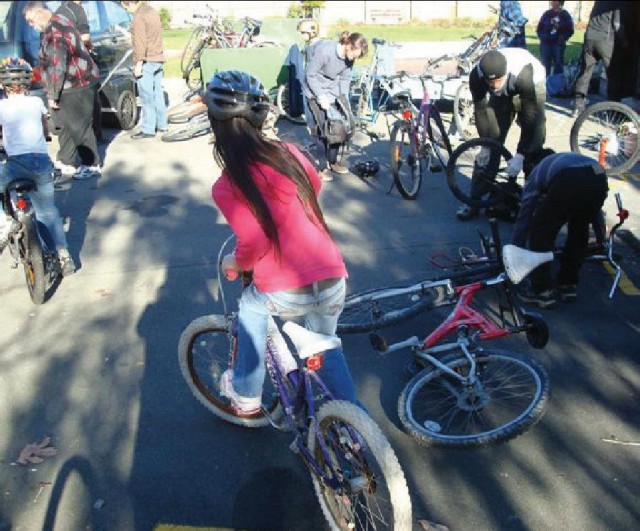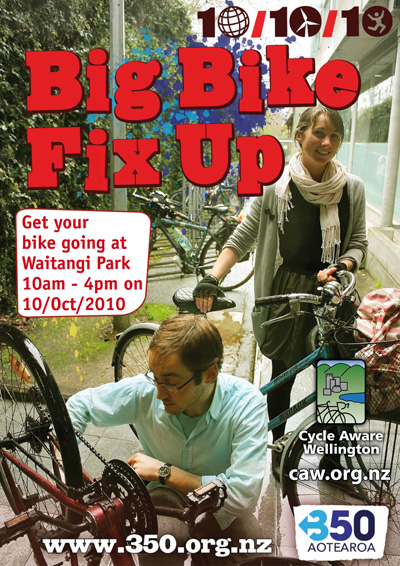 Dr Bike Workshop
Dr Bike Workshop
A few cycling groups have run bike maintenance workshops as part of supporting their community and community events, and building the numbers cycling. Others are intending to do a workshop as part of a big event e.g. October 10:10 climate day of action. For inspiration see what different groups have done or are intending to do listed below in the last part of this article.
Here's a few hints to share with others intending to do these workshops whether it be a one off splash to mark an important occasion like Bike to Work day or 10:10:10 day of action or an ongoing regular event.
Souped Up Cycles in Christchurch has learnt a few things from running half a dozen of bike maintenance workshops, with a goal of three workshops (Spring, Summer, Winter) a year.
Before the day
Plan for wet weather. Numbers attending may be down but people need warm dry places to do mechanical work and shelter while waiting for their bike to be fixed. Event tents with drop down weather protection sides could be used if you can not get an indoor space. Would you local sports facility or community hall allow bike repairs if tarpaulins were put on the floor?
Ensure you have a basin to hold water to check for punctures.
Have a supply of snacks (e.g. biscuits & muesli bars) & drinks for the mechanics.
Get tools, work benches (allows a mechanic to do more heavier types of tuning) or bike repair stands (mechanics appreciate these as without these a lot of bending in involved), & spare parts sorted (including inner tubes and tyres if appropriate).
Attached is a list of what tools are useful to have on hand. Many mechanics helping out are happy to use their own tools especially for one-off events. However it is probably a good idea on a longer term basis for some basic tools to be bought for such events. These need to be stored in a good place and inventory kept by the local cycle group. Attached is a list of tools and spare parts that Christchurch drew up.
You may be able to get ok tyres and used inner tubes (obviously these will need a puncture repair done) from a cycle shop or cycle touring company that are adequate for giving away.
On the day
It can be chaotic with people turning up with their bikes in various states of disrepair.
People understandably can become frustrated waiting especially if they feel that others are jumping the queue. When you have more than one mechanic (hopefully you do), it can be difficult to ensure "first in first served". If you have bikes to do up and give away as well as bikes to fix this compounds the problem as time can be spent on the give-away bikes that distracts from people's own bikes brought in for repair. If you are giving away bikes then perhaps have a pre-workshop day session where all the mechanics get together and work on the bikes to give away, or match people to bikes on the day, take their details, and work on bikes overtime for people to pick up or drop off to them.
Having a numbering system in place is helpful whereby people arriving with a bike to repair, fill in a basic form (see form attached) with basic details, name and contact details, and a number allocated. The Mechanic lets the organiser know when they are free and the organiser allocates the next number in line. The person getting repairs done takes the form to the mechanic when it is their turn and the Mechanic fills in brief info about what was done afterwards. Collecting facts and figures like this also helps with applying for funding to expand or improve what the workshop delivers (see form attached).
Separate out puncture repairs and the other minor bike repairs (see bike workshop signs attached). The mechanics can then concentrate on the bike repairs and others can fix the punctures.
Where possible a person is taught how to fix the puncture, if they participate and show aptitude or willingness to learn they are rewarded with a puncture repair kit and take home info sheet reminding them of the principles of basic puncture repair (see hints for puncture repairs attached).
Have a couple of "meeters and greeters", with bike maps on hand, and someone to organise the work schedule.
Have someone whose job it is to take photos. Good photos help with flyers for future events, for applying for applications, or for seeking help from the community for donated bikes or touting for mechanics. Check out the flyer for Souped Up Cycles - look at the activity and joy in that photo taken during one afternoon of bike maintenance.
Reward your mechanics with a small prize after their fantastic work (see attached photo of home-made honey handed out at Souped Up Cycles -will attach). Perhaps a small voucher from your local cycle shop...
Have something novel at your workshop e.g. a Bike Milkshake maker (contact Steven Muir at cycletrailers.co.nz for details).
Give away Cycle Maps and bells (get free bells from bike shops as these are removed or not put on new bikes that come into NZ, often these are not the best quality but better to be used until they break than sit in a box getting dusty). Having someone look at a map with a new cyclist and help find the best route from where they live to where they need to cycle is really effective.
Food such as soup, available for free or a gold coin (especially for any winter workshops) is a winner, and adds to the feel good factor for everyone.
After the event
Debrief, congratulate yourselves for a really useful venture that will help get more people cycling, and discuss how to improve your workshop for next time. The "Souped Up Cycles" co-ordinating group usually has a couple of meetings between each workshop with a few emails flying around in between.
Ongoing
Find someone happy to co-ordinate the workshop organising (ensuring everyone follows up on what they are meant to be doing).
Collate a list of cycle mechanics who can help out at events with their phone numbers and email addresses (have the file in one place, perhaps held by the co-ordinator, to add names over time). Try to have a gender balance with mechanics, there are nowhere near as many women mechanics but there are lots of women who are great at basic bike maintenance such as oiling chains and fixing punctures. Seeing other women fixing bikes is empowering for all, especially for women and children. Not all mechanics can make all events, but most are happy to have the option, and the more mechanics you have on the list, the less pressure on each individual mechanic.
People often have bikes in reasonable repair to give away, you just need to find those bikes. Sending an email flyer around to key worksites e.g. IRD, DHBs, & Engineering firms etc can result in a great cache of bikes. Other sources of free bikes are Police stolen bikes (can be difficult to access these, as police procedures often mean these are auctioned. However, evidence with photos and work sheets showing what was done and numbers through and happy punters could sway the Police to donate a few bikes). Recycling places run by the Council can let your group have early access to bikes that come in.
Strip bikes that come in that are too far gone to repair, for parts such as hand grips, handle bars, good wheels, & tyres etc. The rest unfortunately has to be dumped but much can often be recycled at that dump (hopefully).
Have a list of bikes with serial numbers that have been donated or acquired through the dump, so you can check these are not stolen with Police (obviously bikes from the police have a history already).
If you are giving away bikes on the day you need to consider what you are doing about bike helmets. Can you get some funding to supply helmets? Helmets are best bought new rather than relying on second hand ones.
CAN Groups cycle maintenance workshops
Cycle Aware Wellington (CAW) has been holding Dr Bike clinics for years, often in conjunction with a Bike Wise event such as Bike to Work day. CAW has purchased a bike trailer and bike to take tools etc. CAW is having a Big Bike Fix Up on 10 October.
Cycle Action Auckland in 2010 is having a Big Bike Fix Up day as part of the 350.org events. Here is the video of the Fix up made by Pascal Languillon
http://www.youtube.com/watch?v=_4fKx9Yyfrc
Spokes Canterbury has been working with a local community group, Te Whare Roimata to form a joint membership group called "Icecycles" which is running workshops for fixing up bikes that people bring in with minor issues. Workshops are called "Souped Up Cycles" (name came from soup served at the event). Donated second hand bikes are also done up and given away to people. See attached flyer.
Spokes Dunedin applied for a funding to purchase tools, a second hand bike, and new bike trailer to carry the tools to events. Micro fix up bikes events have been held at the beginning of critical mass events.
